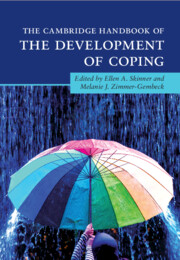Book contents
- The Cambridge Handbook of the Development of Coping
- Cambridge Handbooks in Psychology
- The Cambridge Handbook of the Development of Coping
- Copyright page
- Contents
- Contributors
- Preface
- 1 A Systems Perspective on the Development of Coping
- Part I Theoretical Perspectives on the Development of Coping
- Part II Methods for Studying the Development of Coping
- Part III Neurophysiological and Experiential Bases of the Development of Coping
- 8 The Development of Neurobiology Underlying Stress and Coping
- 9 Biological Systems Underlying the Development of Adaptive Functioning and Coping
- 10 Childhood Adversity and the Development of Coping
- 11 Adolescence, Physiological Adaptation, and the Development of Stress Responses
- Part IV Psychological Foundations of the Development of Coping
- Part V Social Contexts and the Development of Coping
- Part VI Application and the Development of Coping
- Index
- References
10 - Childhood Adversity and the Development of Coping
from Part III - Neurophysiological and Experiential Bases of the Development of Coping
Published online by Cambridge University Press: 22 June 2023
- The Cambridge Handbook of the Development of Coping
- Cambridge Handbooks in Psychology
- The Cambridge Handbook of the Development of Coping
- Copyright page
- Contents
- Contributors
- Preface
- 1 A Systems Perspective on the Development of Coping
- Part I Theoretical Perspectives on the Development of Coping
- Part II Methods for Studying the Development of Coping
- Part III Neurophysiological and Experiential Bases of the Development of Coping
- 8 The Development of Neurobiology Underlying Stress and Coping
- 9 Biological Systems Underlying the Development of Adaptive Functioning and Coping
- 10 Childhood Adversity and the Development of Coping
- 11 Adolescence, Physiological Adaptation, and the Development of Stress Responses
- Part IV Psychological Foundations of the Development of Coping
- Part V Social Contexts and the Development of Coping
- Part VI Application and the Development of Coping
- Index
- References
Summary
Investigations of individuals exposed to early adversity and associated atypical ontogenesis have the potential to complement, challenge, and extend developmental theories of stress and coping. In this chapter, we focus on child maltreatment as one form of early adversity to illustrate how nonnormative caregiving experiences can shape how children respond to stress over the course of development. Specifically, we argue that abusive and neglectful caregiving environments shape psychobiological systems in such a way that a) restricts access to learning experiences and executive resources requisite for more sophisticated forms of coping, and b) increases the likelihood of rudimentary coping skill utilization and involuntary stress responding. We support our argument with a review of literature on how maltreatment adversely impacts psychosocial processes and biological mechanisms (e.g., neuroendocrine, inflammation, neurocognitive, neurobiological) requisite for the healthy development of engagement coping skills (e.g., problem-solving, support-seeking) and discuss translational implications therein.
- Type
- Chapter
- Information
- The Cambridge Handbook of the Development of Coping , pp. 246 - 275Publisher: Cambridge University PressPrint publication year: 2023
References
- 2
- Cited by

